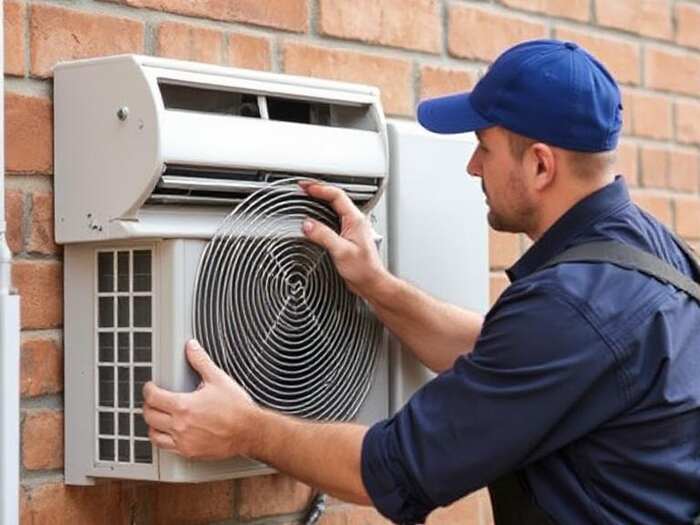When your air conditioner begins to falter during intense heat or unexpected humidity, comfort is more than just a luxury—it’s a necessity. Recognizing the early indicators of trouble can make the difference between a simple fix and an expensive replacement. Air conditioning units are built to endure but aren’t immune to wear, malfunction, or environmental stress. Whether you’re noticing strange noises, poor airflow, or unresponsive controls, each symptom is your system’s way of asking for help.
We will explore the most urgent signs that your AC system requires immediate attention and how acting promptly can prevent further damage, costly energy bills, or complete breakdowns. Knowing when to call for professional help, such as the trusted team at Cullerton Heating & Cooling, could save your equipment, money, and peace of mind.
Clear Indicators That Your Air Conditioner Needs Urgent Help
1. Sudden and Persistent Warm Air Output
If your air conditioning system begins to blow warm air when it should be cooling your home, it’s not just inconvenient—it’s a strong sign that something is wrong. Low refrigerant levels, compressor failure, or a faulty thermostat could cause this. Whatever the reason, your unit is not functioning as intended. Many homeowners initially dismiss this issue as a minor glitch, hoping it resolves independently. Unfortunately, such assumptions often lead to prolonged discomfort and higher repair costs. A system designed to cool should never push out warm air consistently. If you notice this symptom, even briefly, it is essential to contact a technician immediately. Early intervention may uncover a manageable problem before it snowballs into something that requires replacement parts or a full system overhaul. Consistent warm air from a cooling system is your clearest signal to act fast.
2. Unusual Noises That Grow Louder Over Time
Air conditioners aren’t silent, but shouldn’t be loud or alarming. Clicking at startup is common, but clanking, grinding, screeching, or banging noises indicate internal issues. These could be due to loose components, broken motors, or worn-out belts. If these sounds are ignored, internal parts may grind against each other, leading to far more serious mechanical failures. A noisy air conditioner may still be functioning, but just barely. What begins as a simple tightening or lubrication job can escalate into motor burnout or fan damage. It’s crucial to remember that an AC unit in distress will often “speak up” long before it stops working altogether. Paying attention to unfamiliar sounds and acting on them quickly allows you to solve the issue efficiently and affordably. Don’t ignore the noise; it’s your AC’s way of crying out for help.
3. Noticeable Decrease in Airflow from Vents
Weak airflow is another telltale sign that something inside your air conditioning system isn’t working properly. If the air coming from your vents feels weak or inconsistent, there could be a blockage, dirty air filters, duct leakage, or even blower motor issues. These problems prevent your home from reaching a comfortable temperature and can strain your system. Strained components often work harder than they should, leading to burnout or system shutdowns.
Reduced airflow also affects indoor air quality, potentially circulating allergens and dust throughout your living space. Rather than waiting for a total breakdown, weak airflow should prompt an immediate inspection by a qualified technician. Quick action can restore comfort and efficiency, and may extend the lifespan of your system by addressing problems before they spiral. Airflow is a clear performance indicator; when it drops, your AC system calls for help.
If you want to improve your air quality and keep your unit running efficiently, booking a professional Aircon Cleaning Gold Coast service is the best choice.
4. Sudden Spike in Energy Bills Without Increased Usage
A rising utility bill without a corresponding increase in AC usage is often an overlooked but critical sign of trouble. As efficiency drops, your air conditioning system works harder to maintain the desired indoor temperature. This extra effort means more energy is consumed, even if you don’t feel any cooler. Issues such as refrigerant leaks, clogged filters, or malfunctioning thermostats can all contribute to this problem.
Many homeowners attribute higher bills to seasonal changes without realizing their AC is underperforming. You can spot anomalies by reviewing your energy bills and comparing them to the same period in previous years. Once identified, a quick professional inspection can determine the root of the problem. Waiting too long to investigate rising energy costs can result in unnecessary expenses and a faster decline in your AC unit’s overall health. High bills are your system’s way of telling you it’s losing efficiency and needs attention.
When an air conditioner starts showing signs of trouble, delaying repair can lead to discomfort, skyrocketing energy bills, and even total system failure. From blowing warm air and strange noises to inconsistent airflow and higher utility costs, the warning signs are clear—your AC is in distress. Catching problems early not only saves money but also helps preserve the longevity and efficiency of your system.
Maintaining a comfortable home environment requires more than adjusting the thermostat—it demands awareness and timely action when your cooling system begins to falter. Don’t wait until your AC stops working altogether. Whether it’s a strange sound, a spike in your energy bill, or an inability to cool your space properly, trust these signs and seek professional help immediately. Comfort, safety, and savings all depend on it.
If you notice unusual noises or a sudden spike in your energy bills, it might be time to consider professional help. Ignoring these signs can lead to more significant issues down the line, potentially resulting in costly repairs or even a complete system replacement. To avoid such scenarios, it’s crucial to act swiftly. For those searching for reliable solutions, finding AC repair near me can connect you with experienced technicians who can diagnose and fix the problem efficiently. This proactive approach not only ensures your comfort but also extends the lifespan of your AC unit, saving you money in the long run.


